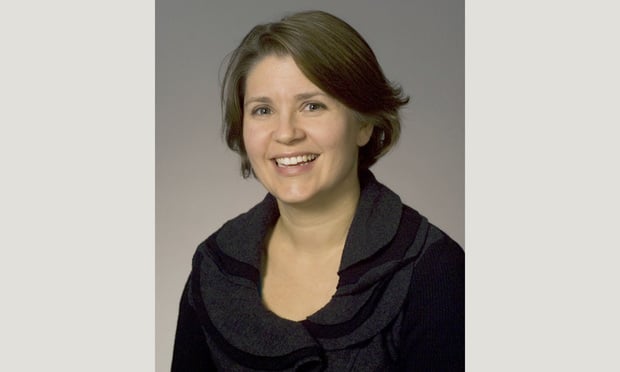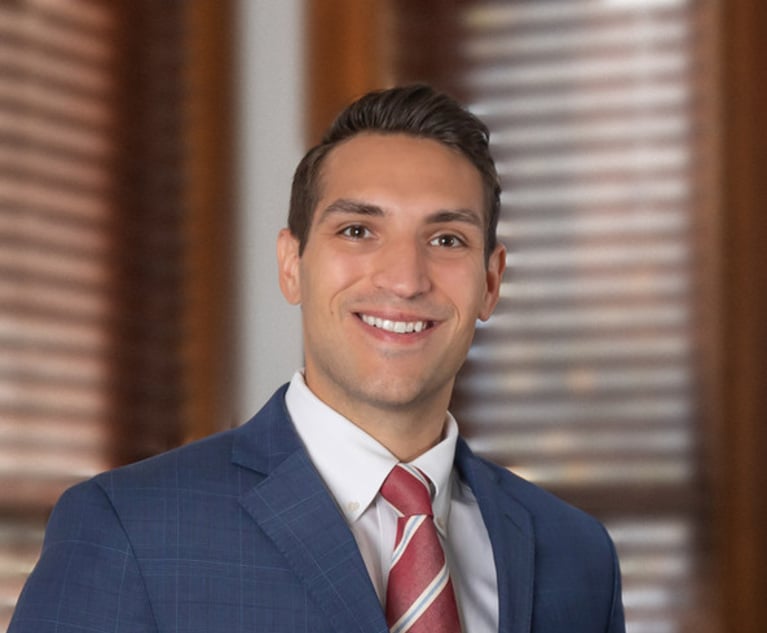Meet Attorney Behind Victory for Sandy Hook Family in Wisconsin
Quarles & Brady partner Emily Feinstein joined the plaintiff's team when she read about the story of Leonard Pozner, a parent whose child died in the 2012 mass shooting at Sandy Hook Elementary School.
October 22, 2019 at 06:04 PM
5 minute read
 Emily Feinstein, a partner with Madison, Wisconsin-based Quarles & Brady. Courtesy photo
Emily Feinstein, a partner with Madison, Wisconsin-based Quarles & Brady. Courtesy photo
When Quarles & Brady partner Emily Feinstein read about Sandy Hook parent Leonard Pozner's lawsuit against Sandy Hook denier James Fetzer, she knew she wanted to be part of the case.
Feinstein, a Wisconsin attorney who has two small children, said she gets the dockets of lawsuits filed in Wisconsin, and the Pozner case intrigued her. What followed for Feinstein was something she said she never could have imagined: a defendant who said a mass murder never occurred; who doubted that grieving father Pozner was the real Leonard Pozner; and who said Pozner's son's death certificate was a fraud.
A Wisconsin jury saw things differently from Fetzer, a retired University of Minnesota at Duluth professor. It awarded Pozner $450,000 on Oct. 15 over conspiracy theories that are likely to have an impact in similar cases in Connecticut.
Fetzer and his attorney, Madison, Wisconsin-based Richard Bolton, have already said they will appeal. Bolton did not respond to requests for comment Tuesday.
Feinstein said the Sandy Hook mass shooting was "heartbreaking" for her, and she wanted to do anything she could to help Pozner, who sued for defamation over a book Fetzer co-authored, "Nobody Died at Sandy Hook."
"I had just come back from work after my second maternity leave when Sandy Hook happened," Feinstein said of the December 2012 massacre in which shooter Adam Lanza took the lives of 20 schoolchildren and six educators at Sandy Hook Elementary School. "There has always been a place in my heart for those families. When I saw what this poor father went through in bringing this lawsuit, I wanted to do what I could to help."
So Feinstein, pro bono coordinator for her firm, called up husband-and-wife Minneapolis attorneys Jake and Genevieve Zimmerman, asking if she could come on board, and offer her services free of charge. The Zimmermans agreed to collaborate with Feinstein and her colleagues Marisa Berlinger and Emily Steadman.
Feinstein, who picked the jury and argued motions in front of the judge, said the bizarre nature of the case soon became evident.
"At the first hearing in the case, Mr. Fetzer demanded that Mr. Pozner prove he was Mr. Pozner," the attorney said. "It was a scheduling conference, and we suspected he'd try these shenanigans. The judge said, 'No, it's not going to work.' I've never had another case like this."
'Fake, forged or fabricated'
Since summary judgment was granted in June, the jury was only looking at how much to award Pozner. The strategy going in, Feinstein said, "was not to litigate whether the shooting happened, rather this was a narrowly tailored defamation case."
"We were just addressing four statements made by Mr. Fetzer," she said.
Among the alleged defamatory statements: three references in Fetzer's book and one in a blog post about the death certificate of 6-year-old Noah Pozner.
"He kept on saying the death certificate was fake, forged or fabricated," Feinstein said. "We hinged our case on that, and just needed to get the authentic copy of the death certificate."
But Feinstein said even that was not good enough for Fetzer, who claimed that since certain parts of the certificate appeared to be shaded, the document was fraudulent.
While Fetzer and Bolton tried to center the litigation around the First Amendment's free-speech protections, Feinstein argued otherwise.
"The First Amendment gives the right to free speech, but it doesn't give them the right to be free from responsibility for the effects of their speech," she said.
Feinstein applauded the jury's conclusion.
"It's the first case that went to verdict against these hoaxsters," she said. "It's incredibly validating that the jury gave significant damages against a relatively minor player like Mr. Fetzer."
Another surprise at trial: the emotions displayed.
"The jury was crying during opening statements," Feinstein said, "Then when Mr. Pozner testified, my goodness, the judge appeared to be crying. He wiped an eye or two."
Feinstein said Fetzer never made physical threats against Pozner, but those who read his book allegedly did.
"A woman who made threats against Mr. Pozner mentioned the book," Feinstein said. "That book has had a big impact on Mr. Pozner. When misinformation like that is out there, it's dangerous."
Pozner's case went to trial as other Sandy Hook families have brought a defamation suit against right-wing radio host and InfoWars star Alex Jones. That litigation is pending in Connecticut. Soon after the school shooting, Jones denied the massacre. He has since walked back those statements.
Related stories:
Conn. Legal Experts Weigh In on Wis. Jury Verdict Secured for Sandy Hook Parent
Sandy Hook Families Hire Ex-Solicitor General Verrilli for Fight With Gunmaker Remington
Lawyers for Alex Jones, Sandy Hook Families Make Oral Arguments in Defamation Suit
This content has been archived. It is available through our partners, LexisNexis® and Bloomberg Law.
To view this content, please continue to their sites.
Not a Lexis Subscriber?
Subscribe Now
Not a Bloomberg Law Subscriber?
Subscribe Now
NOT FOR REPRINT
© 2025 ALM Global, LLC, All Rights Reserved. Request academic re-use from www.copyright.com. All other uses, submit a request to [email protected]. For more information visit Asset & Logo Licensing.
You Might Like
View All
Apple Disputes 'Efforts to Manufacture' Imaging Sensor Claims Against iPhone 15 Technology

Patent Disputes Over SharkNinja, Dyson Products Nearing Resolution
Trending Stories
Who Got The Work
J. Brugh Lower of Gibbons has entered an appearance for industrial equipment supplier Devco Corporation in a pending trademark infringement lawsuit. The suit, accusing the defendant of selling knock-off Graco products, was filed Dec. 18 in New Jersey District Court by Rivkin Radler on behalf of Graco Inc. and Graco Minnesota. The case, assigned to U.S. District Judge Zahid N. Quraishi, is 3:24-cv-11294, Graco Inc. et al v. Devco Corporation.
Who Got The Work
Rebecca Maller-Stein and Kent A. Yalowitz of Arnold & Porter Kaye Scholer have entered their appearances for Hanaco Venture Capital and its executives, Lior Prosor and David Frankel, in a pending securities lawsuit. The action, filed on Dec. 24 in New York Southern District Court by Zell, Aron & Co. on behalf of Goldeneye Advisors, accuses the defendants of negligently and fraudulently managing the plaintiff's $1 million investment. The case, assigned to U.S. District Judge Vernon S. Broderick, is 1:24-cv-09918, Goldeneye Advisors, LLC v. Hanaco Venture Capital, Ltd. et al.
Who Got The Work
Attorneys from A&O Shearman has stepped in as defense counsel for Toronto-Dominion Bank and other defendants in a pending securities class action. The suit, filed Dec. 11 in New York Southern District Court by Bleichmar Fonti & Auld, accuses the defendants of concealing the bank's 'pervasive' deficiencies in regards to its compliance with the Bank Secrecy Act and the quality of its anti-money laundering controls. The case, assigned to U.S. District Judge Arun Subramanian, is 1:24-cv-09445, Gonzalez v. The Toronto-Dominion Bank et al.
Who Got The Work
Crown Castle International, a Pennsylvania company providing shared communications infrastructure, has turned to Luke D. Wolf of Gordon Rees Scully Mansukhani to fend off a pending breach-of-contract lawsuit. The court action, filed Nov. 25 in Michigan Eastern District Court by Hooper Hathaway PC on behalf of The Town Residences LLC, accuses Crown Castle of failing to transfer approximately $30,000 in utility payments from T-Mobile in breach of a roof-top lease and assignment agreement. The case, assigned to U.S. District Judge Susan K. Declercq, is 2:24-cv-13131, The Town Residences LLC v. T-Mobile US, Inc. et al.
Who Got The Work
Wilfred P. Coronato and Daniel M. Schwartz of McCarter & English have stepped in as defense counsel to Electrolux Home Products Inc. in a pending product liability lawsuit. The court action, filed Nov. 26 in New York Eastern District Court by Poulos Lopiccolo PC and Nagel Rice LLP on behalf of David Stern, alleges that the defendant's refrigerators’ drawers and shelving repeatedly break and fall apart within months after purchase. The case, assigned to U.S. District Judge Joan M. Azrack, is 2:24-cv-08204, Stern v. Electrolux Home Products, Inc.
Featured Firms
Law Offices of Gary Martin Hays & Associates, P.C.
(470) 294-1674
Law Offices of Mark E. Salomone
(857) 444-6468
Smith & Hassler
(713) 739-1250












